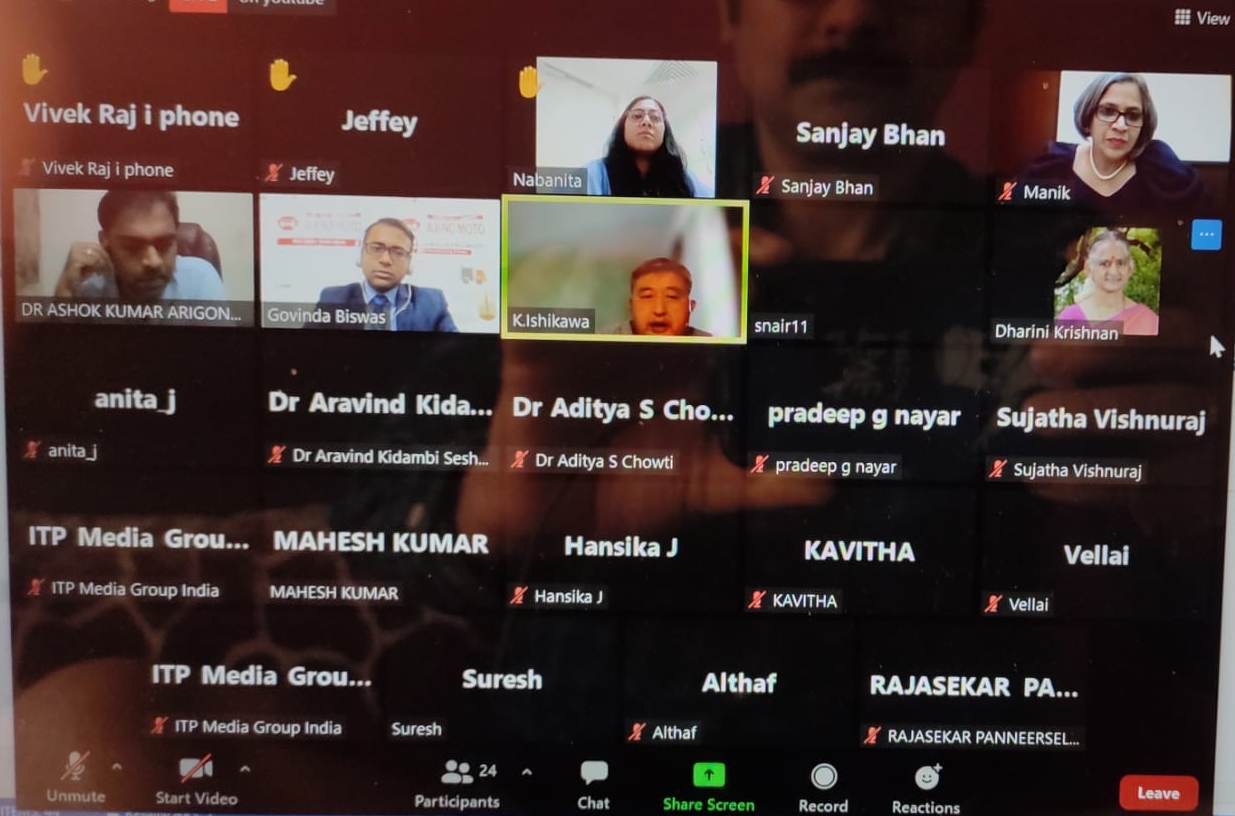Renowned doctors from all over India, along with Ishikawa-Katsuyuki, Managing Director, Ajinomoto India and Govinda Biswas, Manager-Marketing, Ajinomoto India, attended a virtual meet to discuss the truth and facts about AJI-NO-MOTO®(MSG).
Dr Jeffey George – Consultant Gastroenterologist, Aster Medcity Kochi, Nabanita Saha – Chief Clinical Dietician, Manipal Hospital Bangalore, Dr. Aruna Kalra – Senior Gynaecologist & Obstetrician, CK Birla Hospital Mumbai, Dr A. Ashok Kumar – Senior Consultant, Interventional Cardiologist, Rela Hospital Chennai, Anita Jatana – Dietician, Indraprastha Apollo Hospitals Delhi, and Dr Dharini Krishnan, Dietician Chennai are some of the key participants of the virtual meet.
About 1.65 million deaths are reported every year due to heart disease, which can be triggered by regularly consuming more salt than the daily prescribed limit. WHO recommends not more than 5 gm (one tea spoon) of salt intake for a healthy person per day. However, the average daily salt consumption of an adult individual in India is 11 gm (two teaspoons), double what WHO recommends.
Excessive salt intake can cause high blood pressure, leading to a range of health problems including vision loss, heart failure, heart attack, stroke, kidney-disease and sexual dysfunction. Considering the health implications of excessive salt intake, the Food Safety and Standards Authority of India (FSSAI) has taken an initiative through their “Eat Right India” campaign to educate the masses about the importance of reducing the amount of salt in their diet.
Monosodium Glutamate is generically known in India as Ajinomoto. Actually, Ajinomoto Co., Inc. Japan is the first inventor or the commercial manufacturer of the famous taste enhancer of Monosodium Glutamate. Monosodium Glutamate is sold under the brand name AJI-NO-MOTO®. Monosodium Glutamate is produced from the vegetarian sources like Sugarcane or Tapioca starch through natural fermentation process. It is basically a Sodium salt of glutamic acid.
Ishikawa-Katsuyuki, Managing Director, Ajinomoto India said, “MSG contain only one third sodium (12%) compared to that of table salt (39%). In general, the amount of MSG used is less than that of salt including not only table salt but also that derived from seasonings, thus the sodium derived from MSG in food is reduced further. Normally if we reduce the salt quantity in a dish than the test also reduces. But if we reduce the salt in the dish and add a pinch of MSG, the study has shown that it helps us to reduce the salt intake significantly almost by 30% but at the same time it helps maintain the delicious, well-balanced taste of the dish. This is because of the presence of the glutamic acid in the MSG, which is easily soluble and dissolve smoothly in any dish and enhances the taste of the dish naturally. Thus, in the present scenario, MSG can be proven a blessing in disguise for the Indians consumers. As they can significantly reduce the salt intake without compromising the overall taste of the dish, anyone can try out the umami seasoning AJI-NO-MOTO® (MSG) without any worries.”
Said Govinda Biswas, Manager-Marketing, Ajinomoto India, “Glutamic acid provides pleasant “brothy” or “meaty” long-lasting, mouth-watering taste and coating sensation to the tongue Regulatory bodies like FSSAI, USFDA, JECFA have thoroughly done research on this food additive and declared it: generally recognized as safe for human consumption and no global regulatory bodies have fixed any acceptable daily intake (ADI) level for this food ingredient.”
Dr Dharini Krishnan, Dietician said, “Mono Sodium Glutamate is very safe for humans as it is manufactured from natural ingredients. Glutamic acid or glutamate is an amino acid, which occurs in nature and found in foods commonly eaten by people. It is present in fruits, vegetables, tomatoes, cheese, and even human milk. MSG is a flavor enhancer comprising water, sodium, and glutamate. It also adds nutritional value to the food that we consume.”


